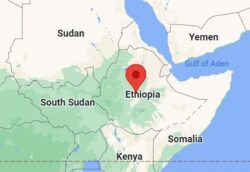By Andualem Sisay Gessesse – After two bloody civil war, and struggle with COVID-19, Ethiopia finally prepares to fully open its door fully for business. The war between TPLF and the Government started in November 2020 is now concluded with peace deal and disarmament. As a result, everyone is optimistic and looks for the using the business opportunities the country offers. Meanwhile, investing in Ethiopia will risky without a proper risk advisory and an insider insight on the ground.
The news of the peace deal is most welcomed by every peace-loving people of the world ranging from a smallholder farmer in Tigray, to a streetcleaner and a tycoon in the capital Addis Ababa. The fact that the two sides finally inked the piecemeal has also got huge support from Ethiopia’s development partners, which were putting pressure on the Government to of Ethiopia often described as unfair and one-sided pressure.
The civil war, which followed the COVID-19 crisis, was a major obstacle to the long awaited political and economic reforms of the country, which involves the liberalization of major sectors including banking, telecom, and logistics, among others.
The war has tempted many foreign businesses to reexamine their investment decisions. Many have either changed their plan to invest in Ethiopia or delayed while others have closed their existing businesses, especially those found in the war areas.
Now that Ethiopia, which like most of African countries is considered as land of opportunities for business, is back on track and welcoming foreign direct investments from all corners of the world. Foreign investments stuck due to the war has now begun reactivating the implementations of their projects that includes minerals development, agribusinesses, real estate, ICT, hotel and hospitality, among others.
Indeed, the east African country with about 120 million population offers huge opportunity for investors. Any business be it interested to invest in consumer goods production or trading, or delivery of any kind of service including banking and insurance can easily benefit from this huge market.
In addition, the fact that Ethiopia has recently joined the African Free Continental Trade Area (AfCFTA), helps any investors in Ethiopia to easily access the biggest common market in the world with about 1.3 billion people.
Meanwhile as we all know investment in Ethiopia or anywhere else for that matter wis not without risk. Of course, some investment risks can be anticipated and avoided, while the impact of unanticipated business and political risks can be minimized by consulting with the right insider experts and business consultants.
In country of transition with complicated politics and business interests attached here and there, knowing who is who in advance by recruiting the best insider risk advisors in Ethiopia can later save an investor from a huge loss and regrate.
A well-done due diligence, competitor insight, business intelligence, and political risk analysis, document retrieval, asset tracing, source-of-wealth enquiries, site visits, stakeholder mapping, market intelligence, and investigation in advance by insider experts can enable an inventor the get the real picture on the ground.

